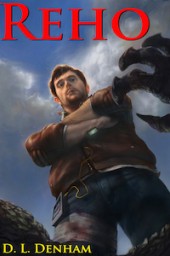REVIEW: “Reho: A Science Fiction Thriller (The Hegemon Wars)” by D.L. Denham
Friday , 12, September 2014 Book Review Leave a comment In a conversation with French New Wave film director François Truffaut, Hitchcock explained the difference between surprise and suspense.
In a conversation with French New Wave film director François Truffaut, Hitchcock explained the difference between surprise and suspense.
Let us suppose that there is a bomb underneath this table between us. Nothing happens, and then all of a sudden, “Boom!” There is an explosion. The public is surprised, but prior to this surprise, it has seen an absolutely ordinary scene, of no special consequence. Now, let us take a suspense situation. The bomb is underneath the table and the public knows it, probably because they have seen the anarchist place it there. The public is aware that the bomb is going to explode at one o’clock, and there is a clock in the decor. The public can see that it is a quarter to one. In these conditions this innocuous conversation becomes fascinating because the public is participating in the scene. The audience is longing to warn the characters on the screen: “You shouldn’t be talking about such trivial matters. There’s a bomb beneath you and it’s about to explode!”
In the first case we have given the public fifteen seconds of surprise at the moment of the explosion. In the second case we have provided them with fifteen minutes of suspense.
In Reho, there is no bomb under the table, but there’s a group of post apocalyptic merchants delivering a mysterious cargo to an unnamed location by an anonymous benefactor and it may or may not have to do with the alien hegemons who control the planet. It’s not until nearly two thirds of the way into the story that we get any real answers. Here’s a riddle for you: if you don’t reveal what your basic plot is until two thirds of the way in, is it suspenseful or surprising? When the main character becomes incurious solely as a way to protract the story, the answer is neither one: it’s just plain annoying.
The relationship between an author and his reader is built on trust. D.L. Denham built up some good will with me in “Red Denver”, the prelude to this novel, but about halfway through “Reho” he lost me.
The Mad Max apocalyptic world so nicely set up in the opening, with its bleak blastsoil landscape and roving bands of gangsters, is jettisoned as the main character Reho joins up with a ragtag group of merchants and ventures out across the sea to New Afrika. Each time he ventures into a new city it feels like we’re switching into a different genre. There’s “Darksteam,” a steampunk world where industrialists fight luddites. On the way to a mountain city we get a bit of a horror sequence with genetically modified human-beast hybrids. Then in the alien controlled city of Neopan we get cyberpunk with a Neuromancer/The Matrix plot.
The main throughline is too vague to hang all these different ideas on. When the stakes aren’t clear in an action story, I just don’t really care what is happening. And while I tend to enjoy a genre-layered sandwich of a story, there’s not enough originality to connect them together into a cohesive whole.
Most distressing is that the author seemed to lose some of his voice as a writer. Gone is Reho’s wit and world-weary point of view. The guy is a drifter and a lone wolf type: why does he join up with the group so easily?
Because if he resists, the Big Reveal would have had to come in the first act. In a contrived attempt to create both suspense and surprise, the reader gets neither.
4/10 for ambitious genre sandwich and more or less nonstop action
Please give us your valuable comment